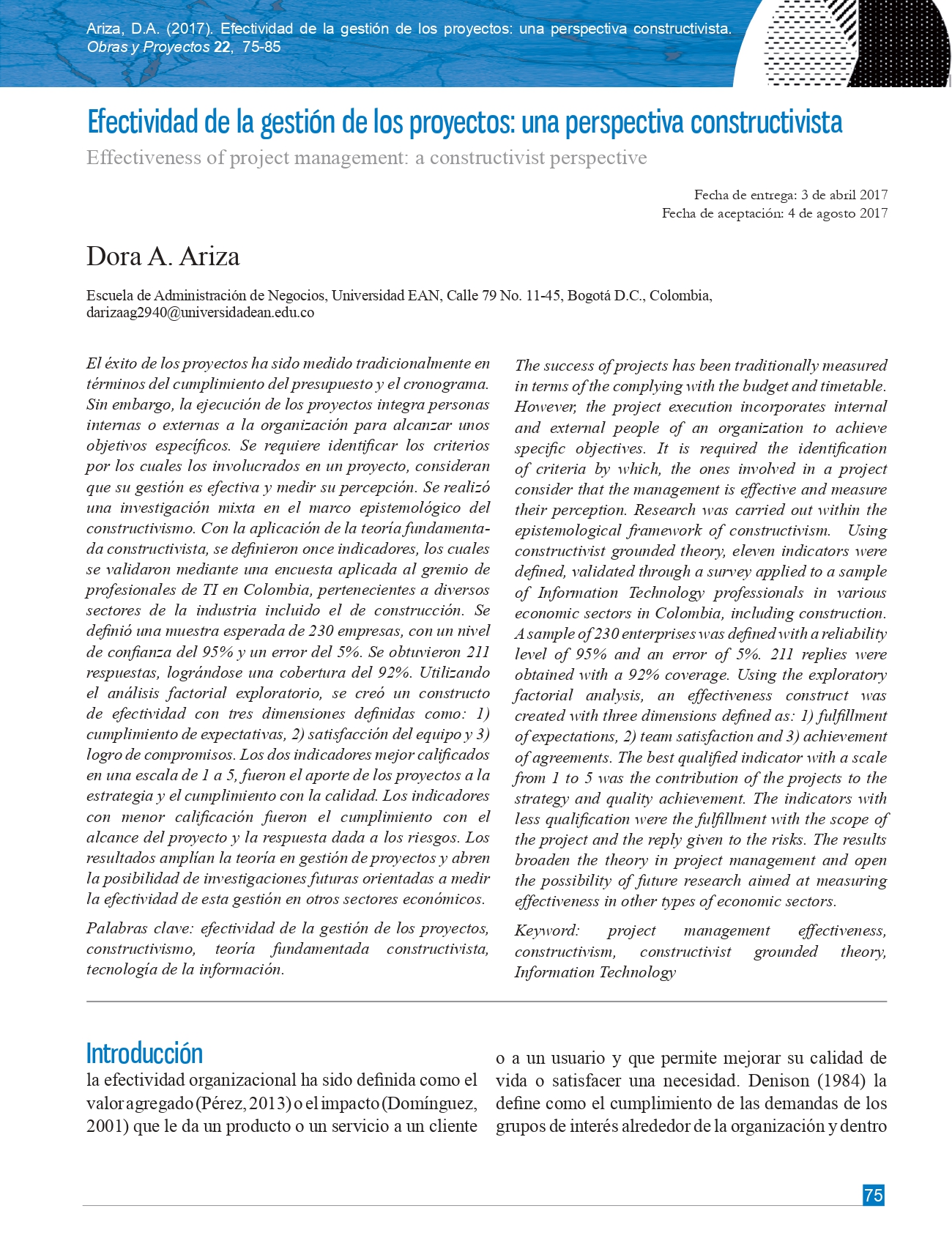Efectividad de la gestión de los proyectos: una perspectiva constructivista
DOI:
https://doi.org/10.4067/S0718-28132017000200075Palabras clave:
efectividad de la gestión de los proyectos, constructivismo, teoría fundamentada constructivista, tecnología de la informaciónResumen
El éxito de los proyectos ha sido medido tradicionalmente en términos del cumplimiento del presupuesto y el cronograma. Sin embargo, la ejecución de los proyectos integra personas internas o externas a la organización para alcanzar unos objetivos específicos. Se requiere identificar los criterios por los cuales los involucrados en un proyecto, consideran que su gestión es efectiva y medir su percepción. Se realizó una investigación mixta en el marco epistemológico del constructivismo. Con la aplicación de la teoría fundamentada constructivista, se definieron once indicadores, los cuales se validaron mediante una encuesta aplicada al gremio de profesionales de TI en Colombia, pertenecientes a diversos sectores de la industria incluido el de construcción. Se definió una muestra esperada de 230 empresas, con un nivel de confianza del 95% y un error del 5%. Se obtuvieron 211 respuestas, lográndose una cobertura del 92%. Utilizando el análisis factorial exploratorio, se creó un constructo de efectividad con tres dimensiones definidas como: 1) cumplimiento de expectativas, 2) satisfacción del equipo y 3) logro de compromisos. Los dos indicadores mejor calificados en una escala de 1 a 5, fueron el aporte de los proyectos a la estrategia y el cumplimiento con la calidad. Los indicadores con menor calificación fueron el cumplimiento con el alcance del proyecto y la respuesta dada a los riesgos. Los resultados amplían la teoría en gestión de proyectos y abren la posibilidad de investigaciones futuras orientadas a medir la efectividad de esta gestión en otros sectores económicos.
Referencias
ACIS (2014). X Encuesta de gerencia de proyectos. Asociación Colombiana de Ingenieros de Sistemas
Astley, W.G. (1985). Administrative science as socially constructed truth. Administrative Science Quarterly 30 (4), 497-513. https://doi.org/10.2307/2392694
Bartlett, M.S. (1950). Test of significance in factor analysis. British Journal of Mathematical and Statistical Psychology 3(2), 77-85. https://doi.org/10.1111/j.2044-8317.1950.tb00285.x
Belout, A. (1998). Effects of human resource management on project effectiveness and success: toward a new conceptual work. International Journal of Project Management 16(1), 21-26. https://doi.org/10.1016/S0263-7863(97)00011-2
Bryde, J.D. (2003). Modelling project management performance. The International Journal of Quality & Reliability Management 20(2), 229-254. https://doi.org/10.1108/02656710310456635
Chametzky, B. (2013). Generalizability and the theory of offsetting the affective filter. Grounded Theory Review 12 (2), 35-43
Charmaz, K. (2008). Constructionism and the grounded theory method. Handbook of constructionist research. Holstein and Gubrium (eds.). The Guilford Press, New York, 397-412
Charmaz, K. (2006). Constructing grounded theory: a practical guide through qualitative analysis. Sage Publications, London
Cobern, W.W. (1993). Constructivism. Journal of Educational & Psychological Consultation 4(1), 105-113. https://doi.org/10.1207/s1532768xjepc0401_8
Cooke-Davies, T. (2002). The “real” success factors on projects. International Journal of Project Management 20(3), 185-190. https://doi.org/10.1016/S0263-7863(01)00067-9
Denison, D.R. (1984). Bringing corporate culture to the bottom line. Organizational Dynamics 13 (2), 5-22. https://doi.org/10.1016/0090-2616(84)90015-9
De Wit, A. (1988). Measurement of project success. International Journal of Project Management 6(3), 164-170. https://doi.org/10.1016/0263-7863(88)90043-9
Din, S., Abd-Hamid, Z. and Bryde, D.J. (2011). ISO 9000 certification and construction project performance: The Malaysian experience. International Journal of Project Management 29(8), 1044-1056. https://doi.org/10.1016/j.ijproman.2010.11.001
Domínguez, G. (2001). Indicadores de gestión. Un enfoque Sistémico. Bogotá: Biblioteca Jurídica Dike
Fernandes, G., Ward, S., Araujo, M., Loureiro, I. and Braga, A. (2014). Perceptions of different stakeholders on improving and embedding project management practice in organisations. Procedia Technology 16, 957-966. https://doi.org/10.1016/j.protcy.2014.10.049
Fortune, J. and White, D. (2006). Framing of project critical success factors by a systems model. International Journal of Project Management 24, (1), 53-65. https://doi.org/10.1016/j.ijproman.2005.07.004
Fosnot, C.T. (2005). Constructivism: theory, perspectives and practice. Teacher College Press, New York
Glaser, B.G. and Strauss, A.L. (1967). The discovery of grounded theory: strategies for qualitative research. Aldine de Gruyter, New York. https://doi.org/10.4324/9780203793206
Gregory, R.J. y Ruiz, V.O. (2001). Evaluación psicológica, historia, principios y aplicaciones. El Manual Moderno, México
Heerkens, G.R. (2002). Project Management. McGraw-Hill
Hussein, B.A and Klakegg, O.J. (2014). Measuring the impact of risk factors associated with project success criteria in early phase. Procedia - Social and Behavioral Sciences 119, 711 – 718. https://doi.org/10.1016/j.sbspro.2014.03.079
Karlsen, J.T. (2011). Supportive culture for efficient project uncertainty management. International Journal of Managing Projects in Business 4(2), 240-256. https://doi.org/10.1108/17538371111120225
Kendra, K. and Taplin, L.J. (2004). Project success: a cultural framework. Project Management Journal 35(1), 30-45. https://doi.org/10.1177/875697280403500104
Kerzner, H. (2001). Strategic planning for project management using a project management maturity model. John Wiley & Sons
Lawshe, C.H. (1975). A quantitative approach to content validity. Personnel Psychology 28(4), 563-575. https://doi.org/10.1111/j.1744-6570.1975.tb01393.x
Lewis-Bech, M., Bryman, A. and Liao, T. (2003). The Sage Encyclopedia of Social Sciences Research Methods. Sage Publications
Morrison, J. and Brown, C. (2004). Project management effectiveness as a construct: A conceptual study. South African Journal of Business Management 35(4), 73-94. https://doi.org/10.4102/sajbm.v35i4.670
Mueller, J. (2014). A specific knowledge culture: cultural antecedents for knowledge sharing between project teams. European Management Journal 32(2), 190-202. https://doi.org/10.1016/j.emj.2013.05.006
Ogbonna, E. and Harris, L.C. (2000). Leadership style, organizational culture and performance: Empirical evidence from UK companies. International Journal of Human Resource Management 11 (4), 766-788. https://doi.org/10.1080/09585190050075114
Oyegoke, A. (2011). The constructive research approach in project management research. International Journal of Managing Projects in Business 4(4), 573-596. https://doi.org/10.1108/17538371111164029
Pérez, R.I. (2013). Gerencia estratégica corporativa con aplicaciones para logística aeronáutica y gerencia de la seguridad aérea. Bogotá: Fuerza Aérea Colombiana, Instituto Militar Aeronáutico.
Quinn, R.E. and Rohrbaugh, J. (1983). A spatial model of effectiveness criteria: towards a competing values approach to organizational analysis. Management Science 29(3), 363-377. https://doi.org/10.1287/mnsc.29.3.363
Qureshi, T.M., Warraich, A.S. and Hijazi, S.T. (2009). Significance of project management performance assessment (PMPA) model. International Journal of Project Management 27(4), 378-388. https://doi.org/10.1016/j.ijproman.2008.05.001
Royal Academy of Engineering (2009). Engineering values in IT. http://www.raeng.org.uk/engineeringIT
SGI (2014). Value versus success & the orthogonals. Chaos Manifesto 2014. Project smart. Standish Group International.
Shenhar, A.J., Dvir, D., Levy, O. and Maltz, A.C. (2001). Project success: A multidimensional strategic concept. Long Range Planning 34 (6), 699-725. https://doi.org/10.1016/S0024-6301(01)00097-8
Smyth, H.J. and Morris, P.W. (2007). An epistemological evaluation of research into projects and their management: methodological issues. International Journal of Project Management 25(4), 423-36. https://doi.org/10.1016/j.ijproman.2007.01.006
Stare, A. (2012). The impact of a project organizational culture and team rewarding on project performance. Journal for East European Management Studies 17 (1), 40-67. https://doi.org/10.5771/0949-6181-2012-1-40
Strauss, A.L. and Corbin, J. (1998). Basics of qualitative research techniques and procedures for developing grounded theory. SAGE Publications, London
Teller, J. (2013). Portfolio risk management and its contribution to project portfolio success: an investigation of organization, proccess, and culture. Project Management Journal 44 (2), 36-51. https://doi.org/10.1002/pmj.21327
Thornberg, R. (2012). Informed grounded theory. Scandinavian Journal of Educational Research 56(3), 243-259. https://doi.org/10.1080/00313831.2011.581686
Tristán-López, A. (2008). Modificación al modelo de Lawshe para el dictamen cuantitativo de la validez de contenido de un instrumento objetivo. Avances en Medición 6(1), 37-48
Westerveld, E. (2003). The Project Excellence Model®: linking success criteria and critical success factors. International Journal of Project Management 21(6), 411-418. https://doi.org/10.1016/S0263-7863(02)00112-6

Descargas
Publicado
Número
Sección
Licencia
Derechos de autor 2017 Universidad Católica de la Santísima Concepción

Esta obra está bajo una licencia internacional Creative Commons Atribución-NoComercial 4.0.







